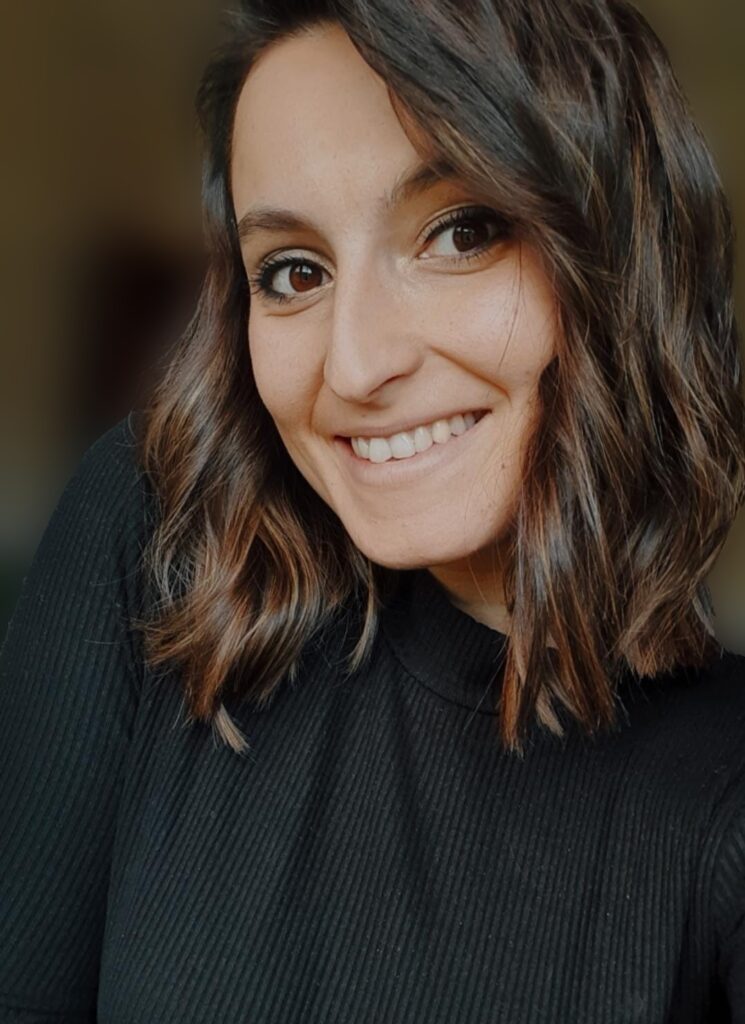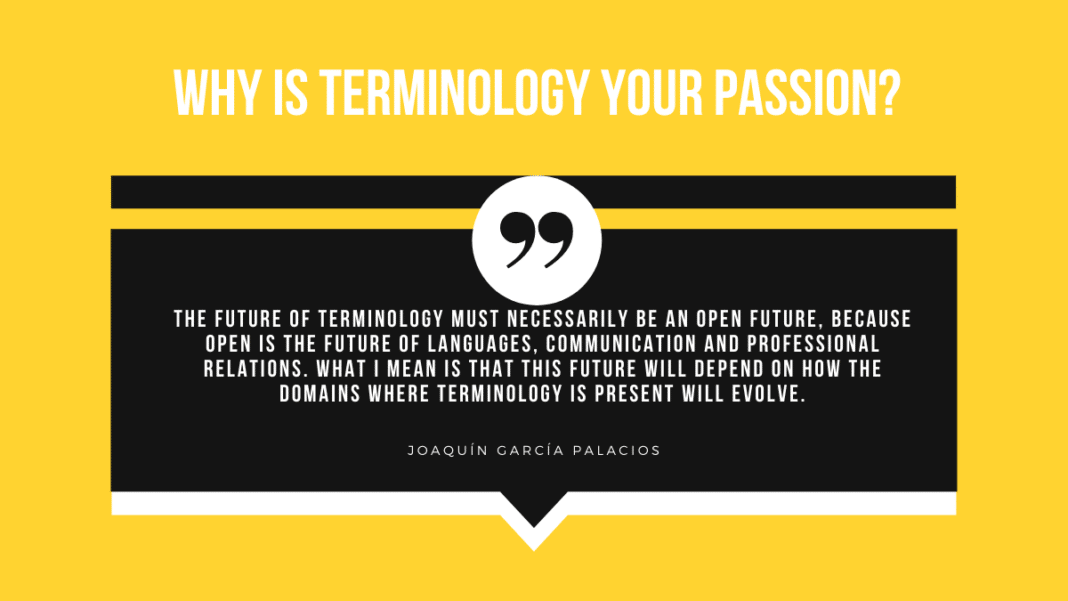
Joaquín García Palacios has a PhD in Hispanic Philology, professor of Terminology (degree in Translation and Interpreting) at the University of Salamanca (Spain) and president of AETER (Spanish Association of Terminology), Joaquín García Palacios focuses his research on terminology, neology, lexicology, lexicography, Spanish language and translation.
You studied Hispanic Philology… At what point in your academic and professional career were you attracted to the field of terminology?
When I was writing my doctoral thesis on the lexicon of love and knowledge in the works of San Juan de la Cruz, I realized that the lexicon I was studying was different from the general lexicon I was working with while collaborating in the writing of a Spanish dictionary…. I discovered that I was doing what others called terminology, that prominent linguists were devoting special attention to the study of terminology at that time (beginning of the 1990s), that there was a whole field of study and very interesting work and that there was much to do and to learn. After obtaining my PhD, I got a position in the Department of Translation and Interpretation at the University of Salamanca, and that is when everything changed. From that moment on I kept researching and teaching Terminology, as part of Translation studies. I was especially interested in the terminology dimension within Applied Linguistics.
In a world led by technology and social networks, how do terminologists address the growing number of neologisms?
As usual, with patience and knowledge. There have always been times when the new has seemed a danger, there have always been people (intellectuals or not) who have thought that. But neologisms do not have to represent a danger for a language; on the contrary, they are a sign of its vitality, of its capacity to adapt to new times. If you are referring to a special type of neologisms, the loanwords from other languages, the situation is partly the same, but it has its peculiarities. As we know, it is a recurring topic throughout the history of all languages. It is a matter closely related to the attitudes of speakers towards their own language and towards the dominant languages. Extreme positions can be adopted, but the important thing is that terminologists base their assessments (which should never be passionate) on a good knowledge of the facts. The point is that languages evolve along with society and that this evolution is based on a balance between the terms generated with their own resources and the loanwords. Balance and knowledge are needed to adapt foreign terms correctly.
For other co-official languages of Spain, institutions such as Termcat are working to avoid the excess of foreign words in Catalan and to achieve terminological standardisation. In the case of Spanish, do you think that enough work is being done to avoid the anglicisms used in Spanish day after day? Who should control this?
It is not about avoiding nor controlling something that is neither avoidable nor controllable. As I have already said, it is a question of adapting and adapting well. Nevertheless, at the same time, it is necessary to further promote specialized communication in languages other than English. Of course, it is very important to have a language that makes international communication easier, particularly in special languages. But it is also essential to take care of other languages of culture. How can we not worry and care about an international language with so much weight in the world as Spanish? We know that demography alone is not enough. We must do something, much more than what we are doing. To take care of a language means to strengthen it, to give it much more value than it already has. And, in this sense, the work that is being done in Catalonia with the special languages seems to me very worthy of study, because we can learn a lot about how to take care of Spanish or other Romance languages.
In 2005, the association you preside, AETER (Spanish Association of Terminology), launched a project to organise terminology in Spanish, based on the ideas of Mª Teresa Cabré. What is the current status of this project?
The project that was originally launched by the Spanish Association of Terminology when Teresa Cabré was its president remains fully valid. It is a comprehensive project, aimed at facilitating unified access to quality terminology in Spanish. How can this be done? By building a platform to access a linguistically sanctioned terminology, validated by experts in each field of knowledge. It is an ambitious project, with a well-designed structure. The need to intervene is very clear, as the Spanish language cannot turn its back on a reality that does not currently benefit it. Therefore, not only the public authorities but also the private institutions must act, as should the people who are currently working with Spanish as a special language, both in Spain and in many other countries around the globe. In these moments of recovery, we are working with new forces and opening new paths in order to gain momentum for a project that is open to the collaboration of institutions, companies and interested people. We hope to have good news soon.
Regarding the translator’s role as a terminologist, have you been able to observe any trends over the last few years? If so, what are they and what has changed?
Many things have changed in the last few years, and those changes have brought significant progress. So I think they have changed for the better. We are increasingly seeing well-trained, versatile professionals with many resources at their disposal; however, they still need the same things that the previous professionals needed to produce quality work: in addition to knowledge about how things work, communication and language are still more necessary than ever in order to see the facts they are working on and all that they imply. Having a very open mind and lots and lots of common sense is key.
What are the most crucial traits that a terminologist has to possess nowadays and what, in your opinion, lies in the future for terminology?
The future of terminology must necessarily be an open future, because open is the future of languages, communication and professional relations. What I mean is that this future will depend on how the domains where terminology is present will evolve. It is quite difficult to know what will happen, but perhaps it is easier to guess how the future of the terminologist will be. The terminologist will have to be an open professional —just like their working field— with very broad training (gained in very different contexts, perhaps) and who will possess many resources for accessing specialized knowledge. Their main trait will probably be their ability to build bridges between scientists and linguists, between specialized knowledge and the knowledge of language. The good terminologist will be a versatile person who is not afraid to innovate.
One of the projects you have been working on is ‘NEURONEO: Neology formation and the regulation process of neologisms in the Neurosciences’, which “aims to address the study and regulation of neological terminology in the different fields of Neurosciences in Spanish from a multidisciplinary perspective”. Why the field of neuroscience? Could you tell us more about the project?
We chose the field of neuroscience because of two facts that we consider very significant: because of the enormous importance that a field focused on the exploration of the brain and the nervous system had, and because this domain held everything we were interested in analysing. It is a constantly evolving field, with many advances and a continuous production of new terminology. It is an innovative area in which the achievements in cutting-edge research are mainly narrated in English, and in which new terminological solutions must be then adopted in Spanish too. We are mainly interested in the study of terminological neology, but also terminological dependence, the relationship between Spanish and English in specialised communication, the collaboration of scientists in validating terminology, the interaction with linguists, as well as the bilingualism –I do not know if it is apparent in many cases– of many scientists. Communication in the neurosciences domain made all this and much more possible.
Which book, paper, project, etc. would you recommend to people, and especially terminologists, to read/ follow?
In 2021 and 2022, two books will be published in English under the title ‘Terminology: cognition, language and communication’ (vol. I and II), which contain the fundamental articles that have served to build the Communicative Theory of Terminology, now translated into English. The author, María Teresa Cabré, had published them over the last 25 years in other languages (mainly Catalan, Spanish and French), so many people have not been able to access the enormous amount of theory contained in these articles. They will be reference books for any terminologist.
How useful do you find tools such as IATE? What do you think should be improved?
There are sufficiently tested databases that we do not need to mention repeatedly in order to point out their numerous qualities. Anyone working in the terminology or the translation field knows the many advantages of using a tool such as IATE, which has been helping translators for many years now. However, since you are asking, in my opinion there are two important aspects that could be worked on to make IATE even better. One is the cross-linguistic asymmetry that occurs, because, as we know, in practice not all languages have the same weight or the same treatment in the database. The second would be to bolster the role of terminologists and their working methodology to ensure that most of the information in the entries in the different languages is extracted from original sources and not from translations.
What advice would you give to novice terminologists?
I will give them my opinion, so that you can consider it or not, and if it can help someone, according to their interests or their way of thinking, all the better. But if not, then so be it. I think it is important to think of terminology as we think of language and languages, to see the same beauty in it, because terminology does have it. It is a fantastic world, with many worlds, as many as there are specialities, and not as rigid as it has often been considered. In terminology there is communication, language, culture, ideology, knowledge… what more could one ask for?
[1] García Palacios, Joaquín & Torres-del-Rey, Jesús & Maroto, Nava & Linder, Daniel & De Sterck, Goedele & Sánchez Ibáñez, Miguel. (2013). NeuroNEO, una investigación multidisciplinar sobre la neología terminológica.
[2] CABRÉ, M. Teresa (2021). Terminology: cognition, language and communication. Volume I: Fundamental elements of terminology as a field of knowledge. Amsterdam / Philadelphia: John Benjamins. Series IVITRA Research in Linguistics and Literature. 308 pp. (in press)
[3] CABRÉ, M. Teresa (2022). Terminology: cognition, language and communication. Volume II: Terminology at the intersection between interdisciplinarity and transdisciplinarity. Amsterdam / Philadelphia: John Benjamins. Series IVITRA Research in Linguistics and Literature. 322 pp. (currently being edited)

Written by Irene Arto Escuredo, ex-Schuman Terminology Trainee at the Terminology Coordination Unit (DG TRAD). She holds a BA in Translation and Interpreting by the University of Salamanca (Spain) and is currently carrying out a Master’s degree in Institutional Translation.

